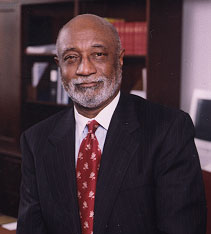- Posted in All University
- Category: Campus News
 Lincoln University President Ivory V. Nelson will speak at St. Paul's Baptist Church in Philadelphia on Sunday, November 18, 2001, and deliver the keynote address during a portion of the program devoted to a focus on achieving a higher education.
Lincoln University President Ivory V. Nelson will speak at St. Paul's Baptist Church in Philadelphia on Sunday, November 18, 2001, and deliver the keynote address during a portion of the program devoted to a focus on achieving a higher education.
Speaking on the topic Educating Minority Youth, President Nelson is scheduled to address the congregation at 10:30 a.m., at the church at 10th and Wallace Streets, in North Philadelphia, according to Dr. Herbert H. Womack, chair of the church's Education and Scholarship Committee.
Founded in 1854, Lincoln University provides the best elements of a liberal arts and sciences-based undergraduate core curriculum and selected graduate programs to meet the needs of students living in a highly technological and global society. The University enrolls 1,871 undergraduate and graduate students.
President Ivory V. Nelson, Ph.D., who has achieved a national reputation for his distinguished leadership in higher education, became the twelfth president of Lincoln University on August 15, 1999. Before coming to Lincoln, he had served as the president of Central Washington University (CWU) for more than seven years. He was formally inaugurated as Lincoln's president on April 14, 2000. A trained chemist, President Nelson is listed among the world's top scientists.
Under President Nelson's leadership, Lincoln University — America's first Historically Black University — is being restored as the institution of choice for students seeking a world-class higher education. Moreover:
- Lincoln has secured a comprehensive review of the University's organizational and management structures from a leading marketing and research-consulting firm.
- The Board of Trustees adopted the University's Statements of Vision, Mission, Philosophy, and Goals to provide an institutional framework for all of our current policies and operational procedures.
- Lincoln has completely eliminated a $1.2 million operating deficit and is currently operating in the black.
- The University received an unqualified opinion from the Pennsylvania Department of the Auditor General for the years ended June 30, 1999, 1998 and 1997.
In addition, President Nelson has a record of active community involvement throughout his 30-plus years in higher education. He served on the board of directors of Key Bank of Washington and was a member of the Washington State Commission on Student Learning, by gubernatorial appointment. He also was a member of the Governor's Blue Ribbon Task Force on the Arts, State of Washington. President Nelson's career in higher education includes receiving the Fulbright Lectureship, teaching graduate and undergraduate chemistry, and serving as department head, assistant dean of academic affairs, and vice president for research.
He has been inducted into Kappa Delta Phi education honor society, Phi Kappa Phi and Sigma Phi Sigma physics honor society. He has authored eleven technical publications in the field of analytical chemistry, a chapter in one book and a chapter in a monograph. He has secured extensive outside funding through grants and proposal writing. In addition, he has acquired significant funding from state legislatures to construct major academic facilities.
His career in the corporate sector includes assignments as a research chemist for both Union Carbide and American Oil Company. President Nelson is profiled in a book entitled, Distinguished African American Scientists of the 20th Century.
The Central Washington University Foundation honored President Nelson by establishing a $50,000 Ivory V. Nelson Endowed Graduate Fellowship in Chemistry, and the Board of Trustees of CWU passed a Resolution in August 1999 conferring on him the title of President Emeritus.
He graduated magna cum laude from Grambling State University, in Louisiana, in 1959, with a bachelor's degree in secondary education, chemistry. He immediately entered the University of Kansas, Lawrence, where he graduated with the Doctor of Philosophy degree in analytical chemistry with high departmental honors.